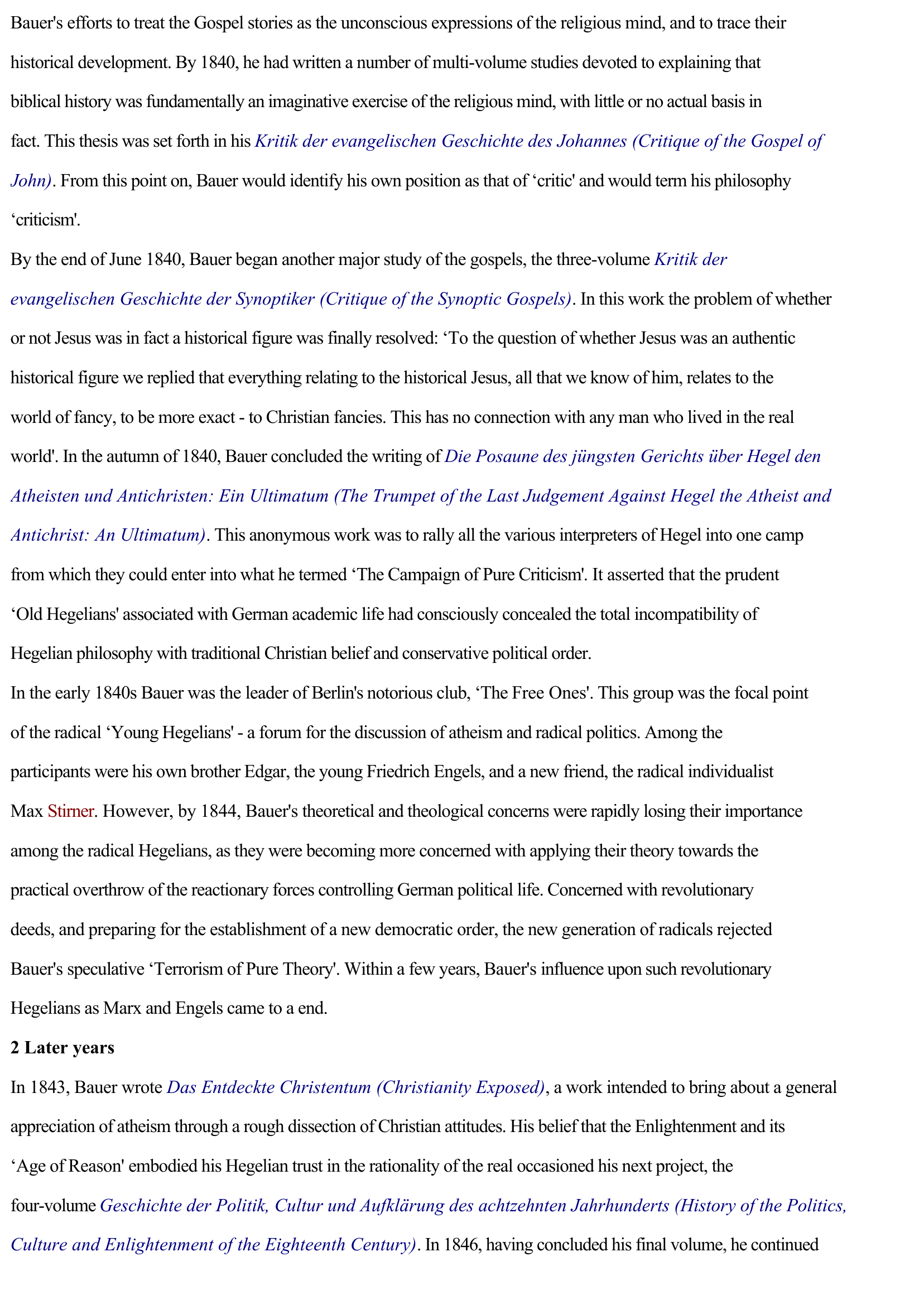Bauer, Bruno
Publié le 22/02/2012

Extrait du document
«
Bauer's efforts to treat the Gospel stories as the unconscious expressions of the religious mind, and to trace their
historical development.
By 1840, he had written a number of multi-volume studies devoted to explaining that
biblical history was fundamentally an imaginative exercise of the religious mind, with little or no actual basis in
fact.
This thesis was set forth in his Kritik der evangelischen Geschichte des Johannes (Critique of the Gospel of
John) .
From this point on, Bauer would identify his own position as that of ‘critic' and would term his philosophy
‘criticism' .
By the end of June 1840, Bauer began another major study of the gospels, the three-volume Kritik der
evangelischen Geschichte der Synoptiker (Critique of the Synoptic Gospels) .
In this work the problem of whether
or not Jesus was in fact a historical figure was finally resolved: ‘To the question of whether Jesus was an authentic
historical figure we replied that everything relating to the historical Jesus, all that we know of him, relates to the
world of fancy, to be more exact - to Christian fancies.
This has no connection with any man who lived in the real
world' .
In the autumn of 1840, Bauer concluded the writing of Die Posaune des jüngsten Gerichts über Hegel den
Atheisten und Antichristen: Ein Ultimatum (The Trumpet of the Last Judgement Against Hegel the Atheist and
Antichrist: An Ultimatum) .
This anonymous work was to rally all the various interpreters of Hegel into one camp
from which they could enter into what he termed ‘The Campaign of Pure Criticism' .
It asserted that the prudent
‘Old Hegelians' associated with German academic life had consciously concealed the total incompatibility of
Hegelian philosophy with traditional Christian belief and conservative political order.
In the early 1840s Bauer was the leader of Berlin's notorious club, ‘The Free Ones' .
This group was the focal point
of the radical ‘Young Hegelians' - a forum for the discussion of atheism and radical politics.
Among the
participants were his own brother Edgar, the young Friedrich Engels, and a new friend, the radical individualist
Max Stirner .
However, by 1844, Bauer's theoretical and theological concerns were rapidly losing their importance
among the radical Hegelians, as they were becoming more concerned with applying their theory towards the
practical overthrow of the reactionary forces controlling German political life.
Concerned with revolutionary
deeds, and preparing for the establishment of a new democratic order, the new generation of radicals rejected
Bauer's speculative ‘Terrorism of Pure Theory' .
Within a few years, Bauer's influence upon such revolutionary
Hegelians as Marx and Engels came to a end.
2 Later years
In 1843, Bauer wrote Das Entdeckte Christentum (Christianity Exposed) , a work intended to bring about a general
appreciation of atheism through a rough dissection of Christian attitudes.
His belief that the Enlightenment and its
‘Age of Reason' embodied his Hegelian trust in the rationality of the real occasioned his next project, the
four-volume Geschichte der Politik, Cultur und Aufklärung des achtzehnten Jahrhunderts (History of the Politics,
Culture and Enlightenment of the Eighteenth Century) .
In 1846, having concluded his final volume, he continued.
»
↓↓↓ APERÇU DU DOCUMENT ↓↓↓
Liens utiles
- SAINTE FAMILLE (La) ou Critique de la critique critique, contre Bruno Bauer et consorts
- Bauer, Bruno - religieux.
- Bauer, Bruno - philosophie.
- Biographie de BAUER (Bruno).
- Bettelheim, Psychanalyse des contes de fées (extrait) Dans Psychanalyse des contes de fées, publié en 1976, Bruno Bettelheim applique aux contes destinés aux enfants le filtre de l'analyse psychanalytique.

































